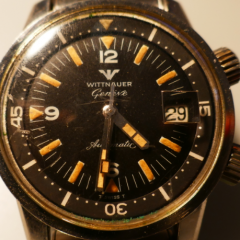Need Technical Manual For Swiss Chrono
-
Recently Browsing
- No registered users viewing this page.
-
Topics
-
Posts
-
Hi I got a Jaeger LeCoultre K911 movement, where one of the stems was broken. Part no. Should be 401. Im based in Europe and tried Cousins but its discontinued there and cant find it on Google. Is there a way out to join the ends? Or an alternative movement to source parts from?
-
The part was how it fell out of the movement - the train wheel bridge wasn’t screwed in. I’ll probably dismantle the part, if I can, to work it out. The train of wheels ran fine - it was only once the keyless works were installed I noticed the problem.
-
By mthomas828 · Posted
Hello, I am about 5 months into watchmaking and I love it! The attention to precise detail is what really attracts me to it. (and the tools!) I am working on a 16 jewel 43mm pocket watch movement. There are no markings besides a serial number (122248) . The balance staff needs replacement. The roller side pivot broke off. I successfully removed the hairspring using Bergeon 5430's. I successfully removed the roller using Bergeon 2810. Did i mention I love the tools?! I removed the staff from the balance wheel using a vintage K&D staff removal tool with my Bergeon 15285 (that's the one that comes with a micrometer adjustment so it can be used as a jewel press as well as a traditional staking tool...it's sooooo cool...sorry.. can you tell i love the tools?) No more digressing.. I measured the damaged staff in all the relevant areas but I have to estimate on some because one of the pivots is missing. A = Full length A= 4.80mm (that's without the one pivot...if you assume that the missing pivot is the same length as the other pivot (I'm sure it's not) then A = 5.12 mm...(can I assume 5.00mm here?) F= Hair spring collet seat F= .89mm (safe to assume .90 here? .. I am sure that my measurement's would at least contain .01 mm error ?) G = balance wheel seat G = 1.23 mm (1.20mm?) H = roller staff H = .59mm (.60 mm?) B = bottom of the wheel to roller pivot B = 2.97mm (3.00 mm?) here I am estimating again because this pivot is missing. So my friends, and I thank you profusely, can you point me in the right direction as to how to proceed? Do i buy individual staffs? or an assortment? Since I don't know exactly the name of the manufacturer, will that be a fatal hindrance? Tbh, I'm not even sure what country of origin this movement is. Thank you! -
By Neverenoughwatches · Posted
Thats why i asked that question earlier, what happens if lubrication is placed directly on top of epilame ? As opposed to walled within its non epilamed area . I'm not saying its right, i have no idea , just asking questions. -
thinking of where epilam should be removed did you know there was a patent that covers this? At least for the escapement I'm attaching it. GB1057607A-1 epilame.pdf
-





Recommended Posts